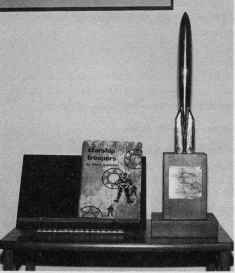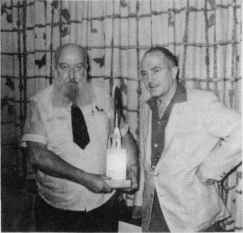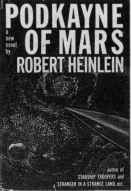Grumbles from the Grave (16 page)
Read Grumbles from the Grave Online
Authors: Robert A. Heinlein,Virginia Heinlein
Tags: #Authors; American - 20th century - Correspondence, #Correspondence, #Literary Collections, #Letters, #Heinlein; Robert A - Correspondence, #Science Fiction & Fantasy, #20th century, #Authors; American, #General, #Language Arts & Disciplines, #Science Fiction, #American, #Literary Criticism, #Science fiction - Authorship, #Biography & Autobiography, #Authorship

Equipment and training has changed since the twentieth century, and each trooper is as well equipped as a modern army. Johnny makes several drops, and gains in experience and rating, and eventually becomes an officer candidate.
November 22, 1958: Robert A. Heinlein to Lurton Blassingame
I finished a draft of a novel, working title
Sky Soldier,
at 5:20 this morning; I will start patching its solecisms and such on Monday. It won't have to be cut other than for dramatic reasons, as the draft runs about 60,000 words—proving that I
can
write a novel without forcing the publisher either to jack up the price or use smaller type . . . a point on which you may have entertained legitimate doubts.
You will receive the ms. some time after the first of the year; my typist will do it during her Christmas vacation. Miss Dalgliesh has inquired as to whether I intended to submit a book; I have admitted that I have—but I have
not
admitted that it has been written. I don't want her to see this until the last possible moment (I have given her only the title and theme: a boy serving his military service in the future). I want to give her the least possible time to have nervous-Nellie second thoughts about it . . . because I am not going to change it to suit her.
January 10, 1959: Robert A. Heinlein to Lurton Blassingame
Earlier today we mailed you two copies of
Starship Soldier
. . . since I anticipate that [Dalgliesh] is not going to like parts of this book,
I might as well get the row over with . . . It is not a juvenile; it is an adult novel about an eighteen-year-old boy. I have so written it, omitting all cleavage and bed games, such that Miss Dalgliesh can offer it in the same list in which she has my other books, but nevertheless it is not a juvenile adventure story. Instead I have followed my own theory that intelligent youngsters are in fact more interested in weighty matters than their parents usually are.
January 21, 1959: Lurton Blassingame to Robert A. Heinlein
Starship Soldier
enjoyed. Except that there were places where action stopped and author went in for lecturing.
Editor's Note:
Starship Soldier
, later
Starship Troopers
, was turned down by the entire Scribner's editorial board.
Lurton called and advised me; Robert was still asleep. I had to tell him.
As a matter of fact, Lurton was certain that he could place the book with another publisher. Walter Minton, president of G. P. Putnam's Sons, later said that one of his editors told him that there was a Heinlein juvenile available. Walter instructed the editor, "Grab it."
Miss Dalgliesh made the following suggestions about the book:
1. use it only as an adult serial
2. sell it elsewhere
3. put it away for a while
The Scribner's connection had ended; with it, the annual quarrels over what was suitable for juvenile reading. After
Starship Troopers
was published, Robert wrote only one more juvenile—
Podkayne of Mars
.
February 19, 1959: Robert A. Heinlein to Lurton Blassingame
. . . I think I have handed you a less salable item than most in this ms. and I will be happy indeed to place it with Mills [Robert P., editor of FcvSF magazine] and with any major trade book house—for which purpose I am willing to rewrite, revise, cut, or expand to
any
extent necessary. From a story standpoint, I am now convinced that this is not my best work; I intend to sweat and make it so. (But, privately to you, revision will be literary revision; I will not let even the ghost of Horace Greeley order me to revise my ideas to fit popular prejudice—I'll hike up the story but the ideas will remain intact.)
"Eppur si muove!"
I stand by my heresies. But I have no intention of saying this to an editor quite so bluntly; I'll simply improve the story as
story
until he will pass it.
March 23, 1959: Robert A. Heinlein to Lurton Blassingame
Now to the pièce de resistance, the Putnam contract for
Starship Soldier.
First, my very warmest thanks to you for your unsparing efforts on this ms. I know that you thought it was weak (and so do I . . . and I intend to try to repair the weaknesses); nevertheless, you sold the serial rights to the leading specialty magazine and trade book right to a major trade house. My morale is greatly bucked up thereby.
I've been rather "shook up" over this ms. . . . The book should be better than it is; I think I can improve it. I certainly will try to, working closely with an editor. Who will be my editor at Putnam?

(84)
Starship Troopers
went on to win the Hugo Award as Best Novel of 1959, given at the World Science Fiction Convention in Pittsburgh.
September 19, 1960: Robert A. Heinlein to Lurton Blassingame
. . . However, the Scribner's angle is a special case. Yes, I do know that Miss Dalgliesh is no longer there. But my irk is not alone at her; it includes Mr. Scribner himself. I feel that I was treated in a very shabby fashion, and I regard him as in part responsible and do not wish to place any more stories with his firm. Scribner's had published twelve of my books and
every single one of them made a profit for them
and each one is
still
making money for them. At one time Miss Dalgliesh told me that my books had kept her department out of the red.
So I offer a thirteenth book . . . and it is turned down with a brisk little note which might as well have been a printed rejection slip, for it was just as cold and just as informative.
I then found it necessary to write to [George McC] to find out what the score was. He told me that it had been a joint action, in which several of the editors had read my ms—
including Mr. Scribner
—and that Scribner himself had joined in rejecting it.
Based on my royalty records I conjecture that my books have netted for Mr. Scribner something between $50,000 and $100,000 (and grossed a great deal more). They have been absolutely certain money-from-home for his firm . . . and still are. Yet after years and years of a highly profitable association, Mr. Scribner let me be "fired" with less ceremony than he would use in firing his office boy . . . not a word out of him, not even a hint that he gave a damn whether I stayed with them or not. I submit that this is rudeness, unpardonable in view of the long association.
Writers hear a lot of prattle about how speculative the trade book business is and how prestige houses (such as Scribner's) will publish a book which might lose money because the author should be encouraged—and hope to make it up on the rest of their list. Well, I seem to be part of the "rest of their list," the part that makes up their losses—for I certainly did not appear to be a writer they were willing to take even a
little
chance on, when it came to scratch. I was simply dumped.
Furthermore, the ms. couldn't have been bad enough to justify dumping me in view of the fact that three other editors bought it . . . and then it went on to win the Hugo [Award] for [1959]. (Besides that, I notice that, despite ----'s earlier worries, the trade book sold 5,000 copies in the first two and a half months . . . and now he tells us that sales are picking up.)
It seems to me that, if the pious crap they hand out about "taking a chance" on authors actually meant anything, Mr. Scribner himself would have said to his editorial board: "Maybe this isn't the best book Mr. Heinlein has ever done—possibly it will even flop and we'll lose a little money on him this time. But his books have been steady sellers in the past and we'll have to give him the benefit of the doubt. Perhaps with a little revision it will be more acceptable; if you don't want to write to him about revisions, let me look over the ms. again and I will write to him . . . but we can't simply reject the book out of hand. Mr. Heinlein is part of the Scribner's family and has been for years."
Too goddamned much to expect, I suppose. At least that was
not
the way he handled it.
Lurton, it seems to me that, with any other successful writer on their list, Scribner's would have published that book—perhaps with revisions and perhaps not as a juvenile—but they would have published it. But if Mr. Scribner felt that he simply could
not
publish it, I think the circumstances called for a note, a letter, a measure of polite discussion, from the boss to me . . . a minimum of formal politeness.
I did not receive that minimum. I think Mr. Scribner treated me with extreme rudeness . . . so I don't want to work for him. Lurton, I have elaborated this matter because, in several letters lately, you have pointed out that the new juvenile editor at Scribner's is anxious "to welcome me back." So I have explained why I am not going back. I have nothing against the lady who now has that department—but the firm is still Mr. Scribner's. If the action had been taken by Miss Dalgliesh alone— But it was
not
; when I got tossed out, Mr. Scribner in person had me by the scruff of the neck and took part in the tossing, without even a formal word of regret.

(85)
Heinlein with his Hugo Award for
Starship Troopers
at the Pittsburgh World Science Fiction Convention.
PODKAYNE OF MARS

(87)
Podkayne of Mars,
G.P. Putnam's Sons, 1963, was Heinlein's last juvenile novel. The cover art is by Irv Doktor.
As originally written
Podkayne
depicted the tragedy of a mother who was too busy with her career to supervise her children's upbringing. Podkayne turns out well enough, although something of a dreamer; her brother is another story, an asocial monster.
Podkayne has as her ambition to be a starship captain, later in life, but when Uncle Tom invites her and brother Clark to go on a cruise to Earth and Venus, ambition is temporarily abandoned. As the result of a political intrigue, Podkayne and Clark find themselves in much trouble on Venus . . . .
March 8, 1962: Lurton Blassingame to Robert A. Heinlein
Enjoyed all of
Podkayne Fries
—except ending. She was such a sweet kid that I hated for you to kill her. That is the Heinlein touch—tell Ginny to beware. It's a good story.
March 10, 1962: Robert A. Heinlein to Lurton Blassingame
Is
Poddy
a juvenile? I didn't think of it as such and I suggest that it violates numerous taboos for the juvenile market. It seems to me that it is what the Swedes call a "cadet" book—upper teenage, plus such adults and juveniles as may enjoy it—and the American trade book market does not recognize such a category. But possibly it might be well to let [Putnam] have this story at once and see what happens.
Lurton, for several years now I have been writing just stories, with no eye on the market, and have been writing them with no criterion save the fixed belief that a story which interests me, and the solution of which satisfies me, will interest and satisfy a sufficient percentage of readers to make the story commercially usable. Maybe I'm wrong about this—maybe I should study the market and try like hell to tailor something which fits the current styles. But it seems to me that, if I am to turn out work of (fairly) permanent value, my own taste (checked by yours and by Ginny's) is what I must follow. Of course, this may result in my losing the market entirely—but I hope that it will result in better stories than if I tried to compound the "mixture as before."